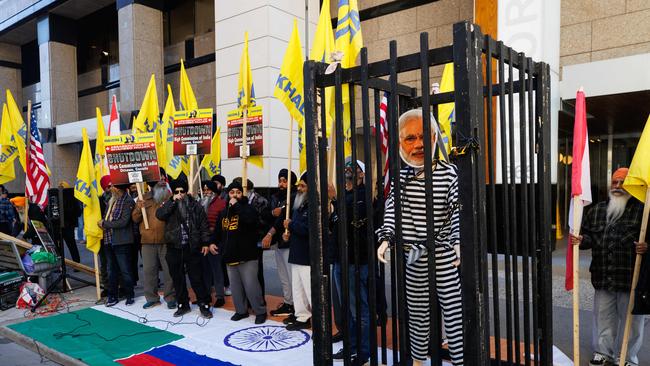Friends can’t tolerate Indian interference

India accuses Canada of harbouring Sikh separatists and supporting them in their separatist activities back into India. Canada says it has evidence of direct involvement by Indian officials in activities that have led to violence and the recent murder of a Canadian citizen, Hardeep Singh Nijjar, in Vancouver.
Canada has expelled the Indian high commissioner and charged Indian nationals in the murder of Singh. Canada’s police commissioner says the force’s investigation has uncovered broad and deep “criminal activity orchestrated by agents of the government of India” and “the harm has continued, posing a serious threat to our public safety”.
India has expelled Canada’s acting high commissioner claiming Trudeau’s government is influenced by a pro-Sikh separatist electoral bloc. The Canadian investigation’s major findings have been made public. The evidence that supports them has not.
But Modi’s government has form around foreign interference and intimidation of critics in Indian diasporas. Late last year, the US Justice Department began a prosecution around a murder plot involving an Indian government employee, working together with others, that involved a plot to assassinate on US soil a lawyer and political activist who is a US citizen of Indian origin.
In Australia, an Indian “nest of spies” was expelled back in 2020 following an ASIO investigation. Questioned about Indian activities here earlier this year, ASIO chief Mike Burgess declined to say whether the Indian government’s foreign operations had caused any concern for ASIO. But there’s no hiding from the policy problem confronting Australian ministers and officials dealing with India. Engagement with Modi’s government can’t ignore its track record of intimidating interventions in jurisdictions that have very friendly, deep relations with Modi’s India.
Australians have had a long debate about the depth and impact of Chinese espionage and interference in our politics, on our university campuses and in university institutions themselves. We’ve passed laws to allow prosecution for some of these activities.
But now we’re confronted by a fellow democracy that appears to reach into our society in ways that can bring internal Indian disputes home to us. The nasty domestic contagion of anger and grievance from the war in the Middle East shows us that stoking violence, anger and dissent inside Australia’s multicultural community is easier than we would wish and is something best dealt with early.
The risks of mismanaging domestic politics are large. We have more than 750,000 Indian- born Australians, with international student numbers adding to diaspora numbers. They have an excellent record of interfaith inclusion and tolerance. But our government has already encouraged Modi to gather them and think of them as fellow Indians sharing his agenda, most obviously through Prime Minister Anthony Albanese’s participation in a highly political stadium rally during Modi’s visit here last year.
We’re working hard to build closer military co-operation with India, to grow our economic relationship, and to work with New Delhi as a partner in the regionally focused Quad grouping. Our government leaders should also ensure Modi understands that we’re risking bigger things if Indian officials think there’s any value in acting unlawfully against Australian citizens here – or in India. If India is to truly be a front-rank power, interference in friendly developed democracies simply can’t happen.
We’re at a point in world politics where we don’t need obstacles created between democracies by flawed policies and actions. Being able to be open about our own flaws and those of others is the right foundation for true strategic relationships. India is a vital strategic partner, so the stakes are high. Silence and pretence don’t hold any answers.
Michael Shoebridge is director of Strategic Analysis Australia. Anthony Bergin is a senior fellow at SAA.



India and Canada are engaged in a battle over foreign interference with big implications for our relationship with New Delhi.